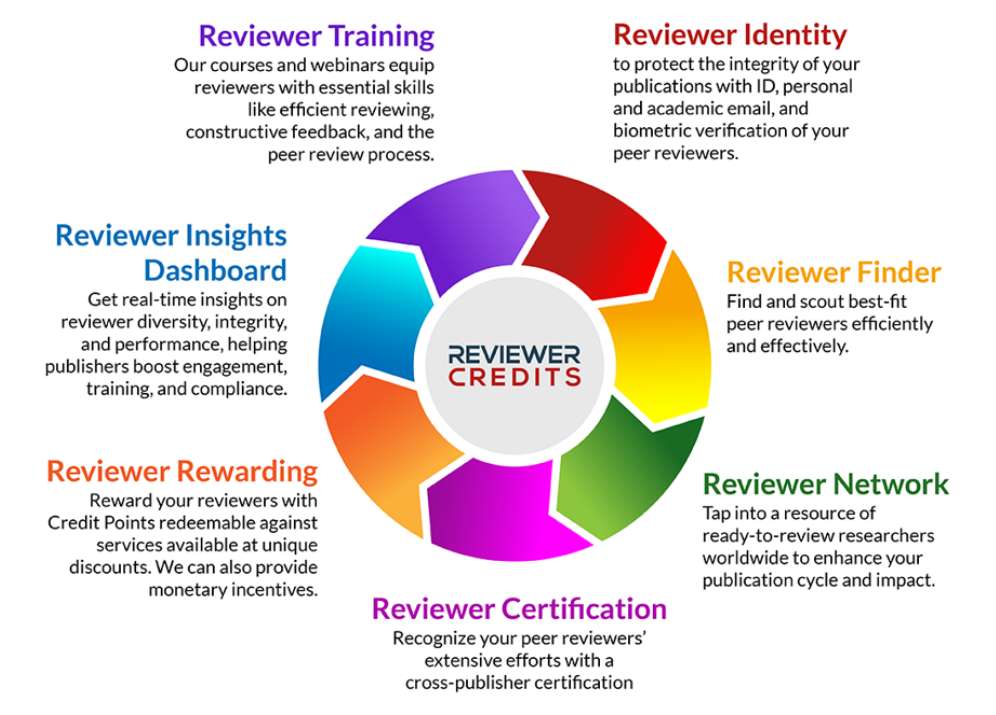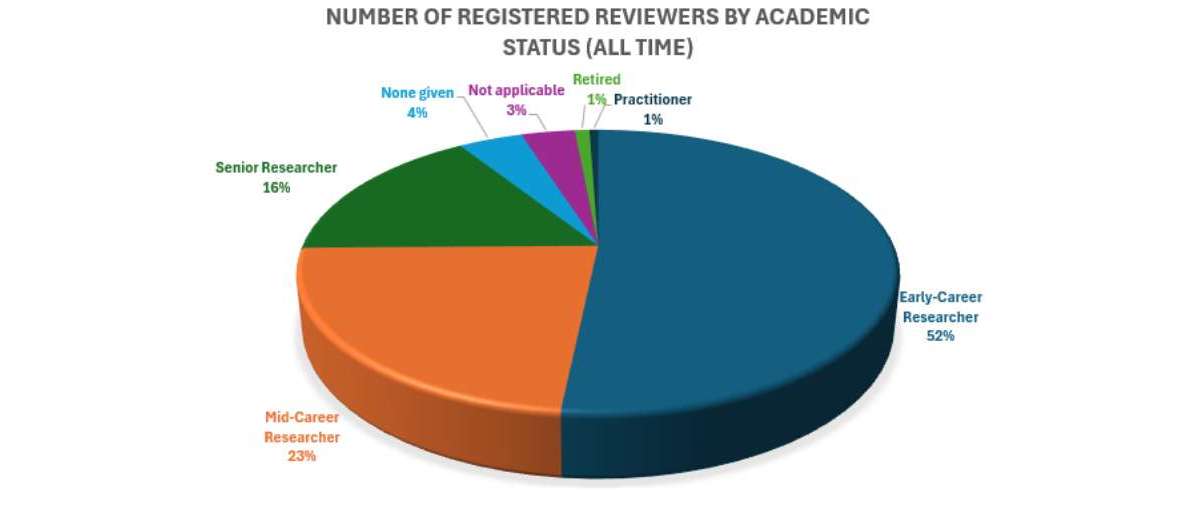Reimagining Peer Review: How Reviewer Credits is Shaping a Fairer, Faster, and More Rewarding Process

Peer review is central to the academic publishing process, yet it remains one of its most undervalued components. Reviewer fatigue, lack of recognition, and the growing challenge of finding qualified reviewers have long threatened the sustainability of this system. Reviewer Credits, a cross-publisher platform, aims to change that narrative by offering recognition, rewards, and reviewer-matching tools that support both researchers and journals.
What is Reviewer Credits?
Reviewer Credits is an innovative platform designed to streamline and support peer review through:
- AI-powered reviewer matching
- Verified reviewer identities
- Tangible rewards and formal recognition
- Professional training and development
By combining these features, the platform addresses core inefficiencies in peer review, helping journals connect with qualified reviewers more quickly while offering incentives to improve participation and review quality.
1. Verified Reviewer Identities:
To maintain credibility, Reviewer Credits verifies every reviewer’s identity. This helps publishers avoid fraudulent or unethical peer review practices and ensures trust in the system.
2. AI-Powered Reviewer Matching:
The platform uses concept-based searching to match manuscripts with the most relevant experts beyond just keyword matching, helping journals save valuable time.
3. A Global Network of Experts:
With over 40,000 registered reviewers and broader access through partner platforms like Global Campus and Prophy, journals benefit from a rich, ready-to-review talent pool.
4. Recognition and Tangible Rewards:
Reviewers earn Credit Points (CPs) for completed reviews. These can be redeemed for services such as editing, data analysis, and training. Shareable certificates also help reviewers showcase their contributions.
5. Dashboard and Analytics:
Journals get real-time insights into reviewer diversity, activity, and performance—helping drive accountability, improve engagement, and build inclusive reviewer communities.
6. Reviewer Training:
With many reviewers lacking formal peer review training, Reviewer Credits offers online courses that enhance ethical review practices and critical evaluation skills.

Figure 1. Flywheel graphic to show Reviewer Credits key products and services.
Why It Matters for Reviewers
For researchers, especially early-career scholars, Reviewer Credits offers value beyond acknowledgment:
- Professional visibility: Completed review certificates can be added to CVs or online profiles.
- Rewards with academic value: CPs can be exchanged for editorial services, boosting researchers' own publishing journeys.
- Customized workloads: Reviewers can set preferences for how often they receive requests.
- Training and upskilling: Accredited courses support skill development and foster a sense of professionalism in the review process.
Why It Matters for Journals and Publishers
Reviewer Credits offers journals:
- Faster, smarter reviewer matching
- Access to a verified and engaged reviewer pool
- Tools to promote diversity and equity
- Incentive systems to encourage timely reviews
- Seamless integration with platforms like OJS, Editorial Manager, and DigiCorePro
Moreover, journals can display certification badges to signal their commitment to high peer review standards, enhancing credibility with authors and reviewers.
Early Impact and Growing Adoption
Reviewer Credits is already shifting peer review norms. Since its launch, the number of registered reviewers has more than doubled, and new partnerships, such as with ScienceOpen, are helping bring peer review recognition into broader scholarly discourse.
The platform is particularly popular among early-career researchers, with over half its users in this career stage. By giving them a way to document and benefit from their contributions, Reviewer Credits helps democratize peer review participation.

Figure 2. Reviewers signed up on the Reviewer Credits platform by academic status.
Looking Ahead: A More Accountable and Transparent Review Culture
As academic publishing trends toward transparency via open peer review, published reviewer reports, and post-publication commentary, Reviewer Credits provides the infrastructure to support this evolution. It offers a middle ground: recognition without necessarily revealing reviewer identities, protecting early-career researchers while promoting accountability.
Conclusion
Reviewer Credits is more than a matching tool, it’s a movement toward a peer review ecosystem that is fairer, faster, and more inclusive. By incentivizing participation, formalizing recognition, and integrating seamlessly with journals’ workflows, the platform helps address longstanding challenges in peer review.
In a publishing landscape under pressure, platforms like Reviewer Credits represent a hopeful shift, one that not only values the critical role of peer reviewers but empowers them.
Keywords
Reviewer Credits peer review platform peer review recognition rewarding peer reviewers AI in peer review research integrity reviewer certification reviewer training verified reviewers peer review incentives
Gareth Dyke, PhD, is a globally recognised evolutionary biologist and paleontologist who has spent more than two decades working at the cutting edge of science – publishing ~380 peer-reviewed articles (including in Nature, Science, and PNAS) and contributing to the discovery of ancient birds and dinosaurs across five continents. He now works in publishing and is the co-founder of Sci-Train, which helps researchers globally understand the writing and publishing process.
View All Posts by Gareth Dyke
Catherine has worked in and with the publishing industry for 30 years, working both for large publishers such as McGraw-Hill, Elsevier and De Gruyter as well as, more recently, for much smaller operations such as Knowledge Unlatched and Reviewer Credits. She is currently Head of Sales with Reviewer Credits, based in a small village in the North of Germany. In this role, which she has held since May 2024, she is talking to journals and publishers all over the world about how Reviewer Credits can support them in improving the peer review process and reducing pain points, while also promoting the recognition of the valuable work which peer reviewers are doing, and which often goes unrecognized.
View All Posts by Catherine Anderson
Founder of E-danex AI-Powered Digital Solutions, graduate of Yasar University in Izmir and Politecnico di Milano.
View All Posts by Emre Danisan
Sven Fund is the Managing Director of Reviewer Credits, the peer review expert network. Prior jobs include leadership positions at Bertelsmann, SpringerNature, De Gruyter, ResearchGate, and Wiley. He holds a degree in European Studies from Washington University in St. Louis and a PhD in Political Science from Muenster University. Through his company fullstopp, Sven invests in startups in publishing and beyond. He lectures in Library and Information Science at Humboldt University in Berlin. He frequently speaks at international conferences around the globe.
View All Posts by Sven FundDisclaimer
The views and opinions expressed in this article are those of the author(s) and do not necessarily reflect the official policy or position of their affiliated institutions, the Asian Council of Science Editors (ACSE), or the Editor’s Café editorial team.



